University of Notre Dame faculty members continue to react to the resignation of Pope Benedict XVI, who stepped down from the papal post, effective Feb. 28. Upon his official resignation at 8 p.m. Rome time (2 p.m. EST), the Catholic Church entered a period called “sede vacante” (empty seat), which will end with the election of a new pope by the Church’s cardinal electors in Conclave.
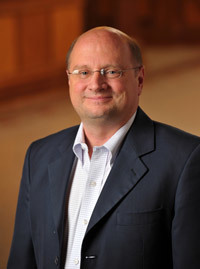 Scott Appleby
Scott Appleby
Notre Dame religious historian R. Scott Appleby praised Pope Benedict’s announcement as an act of courage.
“Pope Benedict XVI has acted courageously in announcing his resignation from the papacy at the end of this month,” Appleby said. “He leaves behind a church still staggering from the sexual abuse crisis, weakened by bureaucratic infighting, curial scandals and papal gaffes, and facing by a host of challenges — to which the pope alluded in his statement today.
“To his credit, Pope Benedict devoted his considerable intellectual skills to the crafting of three excellent and profound encyclicals bringing together the core of Catholic social doctrine with the depths of the theological tradition, and his energies to ‘a new evangelization,’ which the Church desperately needs.”
Appleby, who directs Notre Dame’s Kroc Institute for International Peace Studies, teaches courses in American religious history and comparative religious movements. He is the author of numerous books including “The Ambivalence of the Sacred: Religion, Violence and Reconciliation,” “Church and Age Unite! The Modernist Impulse in American Catholicism” and “Transforming Parish Ministry: The Changing Roles of Clergy, Laity, and Women Religious." He also is co-editor, with Martin Marty, of the five-volume Fundamentalism Project.
Contact: Scott Appleby, 574-631-5665, appleby.3@nd.edu
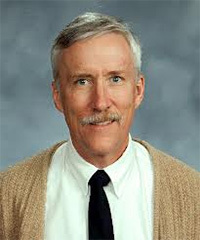 J. Matthew Ashley
J. Matthew Ashley
“I think that this is a wise and courageous decision," said J. Matthew Ashley, associate professor and chair of theology. "Nobody knows better than Benedict the complexity of the global Catholic Church and the resulting demands of overseeing the curial bureaucracy in Rome. While there is no doubt that the papacy has immense symbolic and spiritual power, it is also arguably one of the world’s most taxing administrative positions, and in making this decision it seems to me that Benedict has chosen to prioritize the latter, whereas in his final years John Paul II emphasized the former.
“Of course, this is unprecedented in recent history. It will be interesting to see if and how Benedict chooses to act (or not act) after his resignation. He could very easily continue to exercise in some way the unitive function of the Petrine office. Finally, this decision also saves the church from months or even years of speculation about who the next pope will be, which usually creates more heat (and smoke) than light. Catholics everywhere should celebrate this decision and wish the Pope well as he enters the next phase of his ministry.”
Contact: J. Mathew Ashley, 574-631-6662, ashley.2@nd.edu
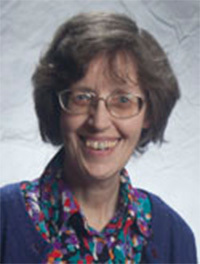 Ann Astell
Ann Astell
“Pope Benedict XVI’s decision to resign from the Petrine ministry is a sign of profound humility and of courage, but above all of love for the Church," said Ann Astell, professor of theology. "The Holy Father has prayed fervently and thought deeply about this decision, which he has taken in freedom and out of clear-sighted concern for the good of the Church. To him we owe an abiding debt of love and gratitude. Let us join him now in prayer for the Church.”
Contact: Ann Astell, 574-631-3047 , aastell@nd.edu
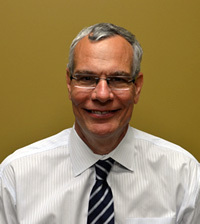 John Cavadini
John Cavadini
“We are losing a great leader, certainly one of the most sophisticated theological minds to serve as Pope in modern history," said John Cavadini, professor of theology and McGrath-Cavadini Director of the Institute for Church Life. "His legacy is one of integration on so many fronts — integration of faith and reason above all, but also of witness and dialogue, culture and community, Catholic Social Teaching and its place in the wider framework of Catholic theology, Eros and Agape — he refused dichotomy and cultivated dialectic. The sublime conviction that ‘God is Love,’ and that the Christian life is one lived in response to the mystery of God’s love, configured his whole theological and pastoral agenda as Pope from his very first encyclical forward.”
Contact: John Cavadini, 574-631-5510, cavadini.1@nd.edu
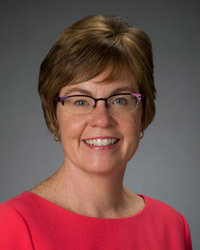 Kathleen Sprows Cummings
Kathleen Sprows Cummings
“Words such as ‘wow,’ ‘whoa!’ and ‘stunning’ have peppered my Facebook feed all morning,” said Kathleen Sprows Cummings, associate professor of American Studies and director of the Cushwa Center for the Study of American Catholicism. "But Pope Benedict’s announcement should not come as too much of a surprise. He himself said on a on a number of occasions that the pope has the right — and perhaps even the obligation — to resign should he feel unable to carry out the duties of his office.
“In light of his increasing frailty, the decision also reflects Benedict’s personality. For decades the world watched the long, slow decline of Pope John Paul II, who characteristically shared his suffering in a very public and poignant way. His successor, a scholar who has never been very comfortable in the limelight, has chosen to impart to the faithful a different lesson: how and when to make a courageous exit. Benedict’s announcement has sparked speculation as to a likely successor and prompted widespread debate over his legacy. Any assessment of the latter will require consideration of his singular achievements, as well as recognition that his papacy was marked by moments and actions far less grace-filled than the announcement of his departure.”
Contact: Kathleen Sprows Cummings, 574-631-8749, cummings.23@nd.edu
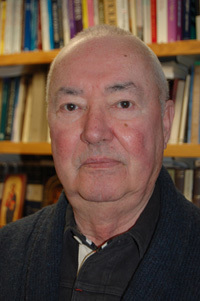 Lawrence Cunningham
Lawrence Cunningham
“Pope Benedict Benedict stepped down, through his letter, in accordance within the norms of canon law," said Lawrence Cunningham, John A. O’Brien Professor emeritus of theology. "He did it freely and while compos mentis. A papal resignation is not unprecedented; there are historical examples, such as Pope Celestine V in the 13th century, and we know that Pope Paul VI thought about resignation.
“What Benedict has done sets a contemporary example for future popes when unable to bear the rigors of the office retire. The church needs to think about orderly procedures for those occasions when the pope becomes ill and unable to make a decision about resignation — as of now, there are not clear procedures for this possibility. Benedict’s decision may precipitate such a consideration.”
Contact: Lawrence Cunningham, 574-233-5492, cunningham.1@nd.edu
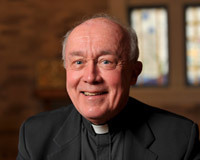 Rev. Brian E. Daley, S.J.
Rev. Brian E. Daley, S.J.
“The idea that the Pope serves for life is not sacrosanct,” said Rev. Brian E. Daley, S.J., speaking of Pope Benedict’s resignation and the upcoming conclave to elect his successor.
Father Daley, Catherine F. Huisking Professor of Theology at the University of Notre Dame, had met with the future Pope Benedict in Germany years ago as a theological scholar. They met again last October in Rome when Father Daley received the Ratzinger Prize from Pope Benedict. “I had the sense then that he was mentally as sharp as ever,” Father Daley said, but he was physically quite frail.”
Reflecting on the challenges facing Pope Benedict’s successor, Father Daley said that a crucial role of any pope is to promote unity in among Christians. “Pope John Paul II described his own office as being primarily a ministry of unity, and I would hope that we will get back to that,” he said.
Contact: Rev. Brian Daley, S.J., 574-631-6629, Brian.E.Daley.3@nd.edu
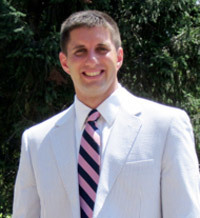 Leonard J. DeLorenzo II
Leonard J. DeLorenzo II
For Leonard J. DeLorenzo, director of Notre Dame Vision, there could be no better moment than the last day of Benedict XVI’s papacy to reflect on the gift of the papacy itself.
“Perhaps at its most basic level, this is the moment to say, ‘Thank you, Benedict,’” DeLorenzo wrote in the Oblation.
Questions about the historical significance of Benedict’s tenure, the quality of his governance of the Church, his institutional failures and successes, are all important, DeLorenzo said, but they “are not questions that reach to the heart of the ministry that Benedict completes today. His ministry—and the ministry of his more than 260 predecessors as well as the one who will assume this ministry within the next several weeks—is primarily a ministry of service to the very unity of the Church.”
According to DeLorenzo, “if we do not see this heart of the ministry of St. Peter, which Benedict has assumed for these past eight years, then we do not see the one thing that gives the rest of the papacy its standard for judgment. Not because of anything he has done, but simply in virtue of the office itself as given first to St. Peter from the Lord, Benedict XVI has served as the representative of the communion of the Church, the unity of which is founded in the communion of God with us.”
Contact: Leonard J. DeLorenzo II, S.J., 574-631-2915, delorenzo.2@nd.edu
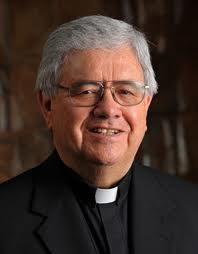 Rev. Virgilio Elizondo
Rev. Virgilio Elizondo
“His announcement is a real witness to the Pope’s wisdom, sincerity and love of the Church," said Rev. Virgil Elizondo, professor of pastoral and Hispanic theology. "As he stated, this was a very difficult decision to make. The next few days will be most interesting and crucial for the future of the Church.”
Contact: Rev. Virgil Elizondo, 574-631-4741, elizondo.2@nd.edu
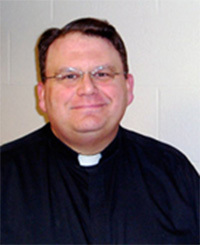 Rev. Msgr. Michael Heintz
Rev. Msgr. Michael Heintz
“Since April of 2005, the Church has been blessed with a chief shepherd whose pastoral vision was deeply rooted in the living tradition of the Church," said Rev. Msgr. Michael Heintz, director of the Master of Divinity Program in the Department of Theology. "He was one of the greatest theologians to be elected to the See of Rome, and yet had a remarkable gift for communicating the profound truths of the faith in a way that both appealed to contemporary men and women and at the same time invited them to enter more deeply into relationship with Jesus Christ.”
Contact: Rev. Msgr. Michael Heintz, 574-631-5682, mheintz1@nd.edu
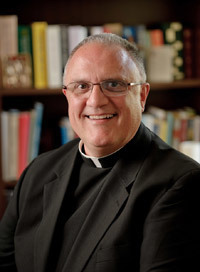 Rev. Ronald J. Nuzzi
Rev. Ronald J. Nuzzi
Pope Benedict XVI will be fondly remembered for his commitment and devotion to Catholic grade schools and high schools, according to Rev. Ronald J. Nuzzi, senior director of the Alliance for Education (ACE) Mary Ann Remick Leadership Program. On the ACE blog Father Nuzzi wrote that Pope Benedict’s support for Catholic schools will be a lasting legacy.
Recalling the pope’s pastoral visit to the United States in a pastoral visit to the United States in April 2008, Father Nuzzi wrote of Benedict’s address at the Catholic University of America in Washington, in which he praised the dedication and commitment of Catholic educational leaders, including teachers, principals, diocesan superintendents, religious educators, university presidents, and professors.
“It was a grand and blessed moment for all involved in the ministry of Catholic education,” Father Nuzzi said, “for such high praise does not often come from such a high office.
U.S. Catholic educators, especially those serving in K-12 Catholic schools, will never forget the Pope’s encouraging words and pastoral visit.
A priest of the Diocese of Youngstown, Ohio, Father Nuzzi has taught in Catholic schools and served as a high school administrator. He has written extensively about the multiple intelligence theory in Catholic education, the spirituality of leadership, and inclusion in Catholic schools.
Contact: Rev. Ronald J. Nuzzi, 574-631-7730, rnuzzi@nd.edu
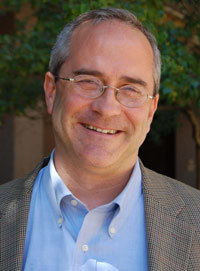 John O’Callaghan
John O’Callaghan
“I think this is the act of an extremely humble man who deeply loves the Church," said John O’Callaghan, associate professor of philosophy and director of the Jacques Maritain Center. "He of all people knows the serious problems the Church faces at this time. And he knows that however weak he gets, modern medicine may keep him alive for a very long time. He has served the Church his entire life, and would now continue to do so by stepping aside so that it can address its problems and be the gift to the world he deeply loves.
“Ancient thought, with which Benedict is deeply familiar, thinks one cannot both be a great man and humble. Christ shows us how this is false — greatness lays itself down for its beloved. I think Benedict is acting in ‘Imitatio Christi.’”
Contact: John O’Callaghan, 574-631-5153, o’callaghan.1@nd.edu
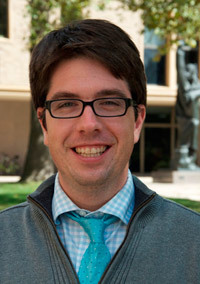 Timothy O’Malley
Timothy O’Malley
Timothy P. O’Malley, director of the Notre Dame Center for Liturgy (NDCL) and a new father, sees in Pope Benedict’s resignation not only an admirable Lenten self-sacrifice, but also an example of how Christian life at any level must be lived.
“Very few of us in the Church will have to let go of being Pope,” O’Malley wrote in the NDCL’s Oblation blog, “but each day, we are faced with opportunities for self-gift, for letting go of our office for the sake of love…Benedict XVI has given each of us something to ponder. The pastor of a parish can see in Benedict’s self-gift a revelation of his own office not as powerful dictator, not as connected to his own charismatic personality, not as boss of a bureaucratic organization, but as an office lent to him by the Church and fulfilled solely in his growing capacity for love. The father and mother can look into their rapidly growing child’s eyes and acknowledge that the office of father and motherhood is not simply about exerting influence in the life of another but in letting their child go, even if this gift requires enormous pain and separation. The heart of every office in Christianity, every duty is love.”
A popular speaker both on campus and at a national level on topics ranging from liturgy, vocation, evangelization, and catechetics, O’Malley is a concurrent professor of theology who teaches courses on theology and imagination, Christian doctrine, and liturgical-sacramental theology.
Contact: Timothy O’Malley, 574-631-0571 tomalley@nd.edu
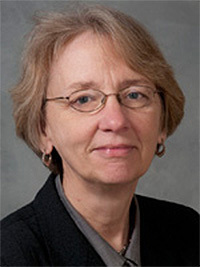 Robin Darling Young
Robin Darling Young
“The emergence of the papacy into the light of daily publicity, with John XXIII and Paul VI, and cultivated celebrity, with John Paul II and Benedict XVI, followed the Church’s engagement with the modern world via Vatican II," said Robin Darling Young, associate professor of theology. "The results were not always comfortable or predictable. It is ironic that Benedict, who aimed to restore the authority of tradition and office after the social upheavals of the last third of the 20th century, should attract further publicity by resigning for the announced reason of ingravescentem aetatem — enfeebling or burdensome old age. The precedent of Celestine V has been frequently cited, but Celestine was a naive monastic who became pope at nearly 80 and fell under the power of the Neapolitan king, Charles II, only to abdicate and be arrested and imprisoned by his much savvier successor Boniface VIII.
“Benedict, on the other hand, seems to follow a growing example of episcopal retirement at the age of 75, despite the decade that has passed since he attained that age, and he may, like those bishops, continue to function as an overseer and guide for the church he has vigorously steered already in the waning years of his predecessor, John Paul. His achievement was to promote the “hermeneutics of continuity,” which cheered some and disappointed others. He was a highly visible, intensely theological pontiff who continued his predecessor’s tradition of attempting to be the conscience of a secularizing world — as seen in his encyclicals and in his style of ruling.”
Contact: Robin Darling Young, 574-631-0382, young.88@nd.edu
